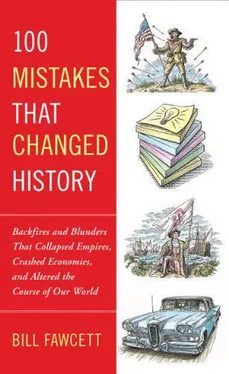Back in Greece, Alexander received an even worse blow than that of the arrow. In July 324 BCE, his beloved companion Hephaestion died from a fever. Alexander threw himself into grief. Many felt this was ultimately the cause of Alexander’s untimely demise. He was never the same. Two years later, Alexander also succumbed to fever. He lingered in his sickness for eleven days. His men worried. Who would take his place? Could anyone take his place? Would any one man be able to hold the vast empire together? At his sickbed, the men leaned over and asked the all-important question, “To whom do you leave your empire?” With his last breath, Alexander uttered words that have since become famous: “To the strongest.”
The empire did not go to the strongest. In just twelve years, it was divided between twenty different rulers, each with his own agenda. If Alexander had only known what those words would cost the empire he fought so hard to establish, the world might have been a different place indeed. Assuming he had named an heir and the Greek empire had survived under one government, then much of the conflict over the next thousand years would have been unnecessary. A strong, unified empire, stretching across Europe and Asia, would have existed 500 years before the establishment of the Roman empire. Had Alexander’s multicultural views become the norm, the world could have avoided much darkness.
Tradition Destroys an Army
216 BCE
One of the worst defeats in Roman military history was due not to just bad generalship but rather to an antiquated command system that begged for disaster and got it. The mistake that lost Rome 50,000 legionnaires in 216 BCE, and almost cost the city of seven hills control of Italy, had its basis in a problem that had occurred ever since there were Greek city-states. In times of war it is necessary to put a great deal of power, such as command of an army, in the hands of one man. This man was known to the Greeks as a “dictator,” a word that has come down in time with amazingly little shift in meaning.
The problem that the Greeks found with dictators was that if you put control of the army, the navy, the administrators, and the treasury in the hands of one man, he may be reluctant to let go of all that power. What do you do with a man who has all the power and won’t let go? The answer was often that there was nothing anyone could do, and trying to get rid of a dictator could have fatal consequences.
So to avoid this trap, the Roman Senate created two equal consuls, who were effectively co-dictators, in the theory that they would counterbalance each other. When not together, the two consuls would separately command the legions with them. The problem and mistake was what happened when you united the entire Roman army into one force, such as was the case at Cannae.
You cannot have two commanders giving orders. But the Senate did not want one commander to become superior because he alone would control all of the legions. Then there was nothing to stop a victorious consul from marching on Rome at the head of his army and taking over. So the solution Rome used was to have the two consuls take turns being in command. One consul would be in charge, and then he turned over control of the entire army to the other consul the next day.
At Cannae, the two consuls were very different men with opposing attitudes and motives. Aemilius Paullus was an experienced soldier, and he was a survivor of the trouncing Hannibal had given the Romans two years earlier in the Battle of Trebia. He was a cautious leader who understood that most of his soldiers were inexperienced and much of Hannibal’s smaller army were blooded veterans. He took a very conservative approach and avoided battle except on terms that greatly favored his army. One of those terms was mandated by the fact the Roman army had plenty of infantry but very little cavalry. Hannibal had four times as many horsemen as the Romans. Most of his cavalry men were both more heavily armored and more experienced than Roman horsemen, and all of them were much better trained and disciplined. In response to this weakness, Paullus kept the Roman army camped in the hills near Hannibal so that if the Carthaginians attacked, his superior cavalry would be of little use.
The other consul was Terentius Varro. He was a member of the Roman Senate and not a soldier. Though shown later to be brave, even resourceful, Varro had an agenda beyond just keeping Hannibal at bay. He was part of a Senate faction that had for two years been frustrated by the tactics used by Fabius, appropriately called “the Delayer,” after the defeat at Trebia. For two years as consul, Fabius had avoided major battles with Hannibal while the Roman army was being rebuilt. But this meant Hannibal had been free to wreak a lot of destruction and destroy a lot of estates all over Italy. His tactics frustrated a good many Senators who constantly demanded more direct action. Varro also needed a victory while he was in command to enhance his prestige in the Senate. So where Paullus wanted to play it safe and fight in the hills, Varro wanted to force a battle where he was sure the superior Roman army (50,000 soldiers versus 40,000 for Carthage) would prevail.
For a few weeks, the two armies camped only a few miles apart. Hannibal was anxious to do something before his supply situation in hostile territory got worse, and Paullus was willing to wait until Hannibal came to him. But here is the rub: Paullus was in command only every other day. For a while he convinced Varro to go along with the waiting. But pressure from Varro’s allies in the Senate and his own ambition made the inexperienced and overconfident consul anxious to have at it.
Finally, on a day he was in command and Paullus could do nothing, Varro moved the entire Roman army out of its strong position in the hills and onto the level ground near what is now called the Ofanto River. When Paullus took over command the next day, the deed was done. They could not retreat without being attacked in the rear by Hannibal’s horsemen. Because of Varro’s impatience, the Romans would be forced to fight where Hannibal’s cavalry had all the advantages. So, being Romans, they attacked.
The Romans moved against Hannibal in a massive column that slammed into the Carthaginian center. Their plan was to break through the center and then turn on both flanks. With superior numbers, the Romans were confident of success and would pit their numbers against the Carthaginians’ best troops. This simple plan and large formation also was easily within the capabilities of an army made up of mostly inexperienced legionnaires and commanders. It was almost a return to the days of the phalanx. The problem was that Hannibal had not, as was normally the case, put his best troops in his center. In fact he put his worst infantry, the brave but undisciplined Gauls, there. This meant that at first the Roman juggernaut pushed forward over the bodies of dead Gauls, but, at the same time, it left the real strength of the Carthaginians untouched.
The massive column rolled forward and began to push the Gauls back as expected. But elsewhere the plan fell apart. Instead of holding the flanks long enough for the infantry to smash through the enemy center, the Roman horsemen, protecting the troops from the sides, fled almost without a fight. In fact, most ran right past the fortified camp and some didn’t stop until they were back in Rome. This left the light infantry that remained on the flanks exposed and almost defenseless before Hannibal’s horsemen. They too were driven off, exposing both flanks. Still the Romans pushed forward, and the Gauls were close to breaking. Only then, with nothing to slow them, did the Carthaginian commander order his best unit, his Spanish Infantry, to curl around and attack both flanks of the thickly massed Roman infantry.
Читать дальше












